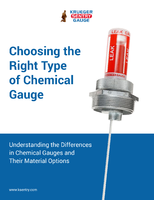A Quick and Cheap Way to Stabilize Your Fridge and Freezer Temperatures
Accurate, Inexpensive Advice to Monitor Your Medical Supplies from CAS DataLoggers
CHESTERLAND OH - If you're part of a hospital or pharmacy staff monitoring and alarming the temperature in your medical refrigerators/freezers, you may be surprised at how much your system's readings can vary throughout the day. CAS DataLoggers has a simple way for you to help protect your valuable inventory and avoid 'false positive' alarms that can arise when the fridge door is opened too often, causing a change in the unit's internal temperature.
In this case, your electronic monitoring system often behaves like a conventional thermometer. The average mercury thermometer has a response time measured in minutes, so it can take 5-10 minutes after a rapid temperature change before the temperature shown on the thermometer stabilizes at the new value.
However, electronic temperature monitors have much faster response times, often measured on the order of tens of seconds. As a result, the temperature you see on your electronic monitoring system will keep fluctuating in temperature as much as 5-10 degrees, and this can be mistaken for a problem with the system. After investigating by viewing the data over a period of several hours or days, though, many people realize that these jumps happen during the time of the day when the door is open and product is loaded or removed.
If these jumps in temperature are a major issue for your organization, you can help to level it out by simply adding a thermal buffer, usually just a small bottle of propylene glycol to the probe (a nylon block can work just as well).
This is a really effective way to stabilize your probe's temperature readings when using any Type K thermocouple bead wire probe. Just 60mL of propylene glycol can be used to mimic the substances you are measuring. The air temperature in the refrigerator may change faster than the temperature of the product you're monitoring, so you may find that the glycol bottles are a better way to see the true temperature of your inventory. Of course, propylene glycol is labeled as an irritant, so avoid all inhalation and contact with the skin or eyes.
Adding the glycol bottle surrounds the probe with a small thermal mass 'buffer' which partially insulates it from drastic temperature spikes cause by frequent door openings (and helps to prevent those annoying 'false positive' alarms). In this way, the thermal buffer makes the reported temperature more closely show your refrigerated product's actual temperature.
We offer a wide range of temperature dataloggers which connect to several types of thermocouple probes to monitor your healthcare products at high precision. Our monitoring and alarming solutions from Accsense VersaLog, T&D and Lascar are an ideal way to meet and document regulatory compliance, as well as warn you when you could be facing a potentially disastrous product loss. Along with your choice of temperature probe, CAS DataLoggers can supply you with propylene glycol bottles to buffer the probes. We take the work out of every step of your selection process and offer free tech support and value-added services including calibration, installation and more.
For more information on available temperature dataloggers from trusted manufacturers including T&D, Accsense VersaLog, or Lascar, or to find the ideal solution for your application-specific needs, contact a CAS Data Logger Applications Specialist at (800) 956-4437 or visit the website at www.DataLoggerInc.com.
Contact Information:
CAS DataLoggers, Inc.
12628 Chillicothe Road
Chesterland, Ohio 44026
(440) 729-2570
(800) 956-4437
sales@dataloggerinc.com
www.dataloggerinc.com




